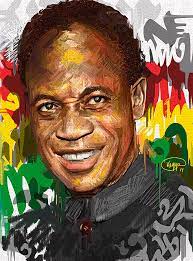Kwame Nkrumah, the first African-born Prime Minister of Ghana, left an indelible mark on the history of the African continent. His radical vision, unwavering determination, and bold leadership were instrumental in guiding Ghana to its long-awaited independence in 1957. This article delves into the life and legacy of Kwame Nkrumah, a revered figure in the struggle for African liberation and a source of inspiration for civil rights leaders, including Martin Luther King.
Early Life and Education
Kwame Nkrumah was born on September 21, 1909, in the British colony of Nkroful, located on the Gold Coast, which later became Ghana. Despite his humble beginnings in a small fishing village, Nkrumah’s thirst for knowledge and passion for change propelled him on an extraordinary journey.
His education took him far from the shores of the Gold Coast to the United States. He pursued his higher education at prestigious institutions, obtaining a Bachelor of Arts in 1939 and a Bachelor of Theology in 1942 from Lincoln University. Continuing his academic pursuits, he attended the University of Pennsylvania, where he earned a Master of Philosophy and a Master of Education in 1942 and 1943, respectively.
The Rise of a Pan-Africanist
Nkrumah’s time in the United States exposed him to the principles of Pan-Africanism and ignited his passion for the African cause. While in college, he became increasingly involved in the Pan-African movement, the African Students Association of America, and the West African Students’ Union. These experiences would shape his future and set him on a path of activism and leadership.
In 1945, Nkrumah played a pivotal role in organizing the Fifth Pan-Africanist Congress, a significant gathering of intellectuals, activists, and leaders dedicated to the liberation of African nations from colonial rule. This congress marked a turning point in Nkrumah’s political journey, solidifying his commitment to the cause of Pan-Africanism.
The Quest for Ghana’s Independence
Kwame Nkrumah’s return to the Gold Coast in 1947 was met with great anticipation. His activism had not gone unnoticed, and he was recruited by prominent Ghanaian politician J. B. Danquah to serve as the general secretary of the United Gold Coast Convention (UGCC). The UGCC was an organization that tirelessly pursued independence for the Gold Coast from British colonial rule.
However, ideological differences and a divergence in strategies between Nkrumah and Danquah led to a defining moment in Nkrumah’s career. In 1949, he founded his own political party, the Convention People’s Party (CPP), which would become the driving force behind Ghana’s fight for self-government.
Under Nkrumah’s leadership, the CPP adopted a nonviolent approach called “positive action.” This strategy aimed to peacefully demand the end of colonial rule and the establishment of an independent Ghana. Through strikes, protests, and relentless advocacy, Nkrumah and the CPP successfully pushed for change.
Legacy and Exile
Kwame Nkrumah’s unwavering commitment to Ghana’s independence bore fruit on March 6, 1957, when Ghana finally achieved sovereignty, becoming the first sub-Saharan African nation to gain independence from colonial rule. Nkrumah’s visionary leadership and tireless dedication earned him the position of Ghana’s Prime Minister.
Despite the challenges and complexities of governing a newly independent nation, Nkrumah remained steadfast in his quest to lead Ghana towards progress and prosperity. His tenure saw numerous infrastructure developments, educational reforms, and social programs aimed at uplifting the lives of Ghanaians.
Tragically, Kwame Nkrumah’s life was cut short by cancer, and he passed away in April 1972 while in exile in Conakry, Guinea. His legacy, however, lives on, not only in the hearts of Ghanaians but in the annals of African history. Nkrumah’s bold vision, dedication to Pan-Africanism, and tireless pursuit of independence have left an indelible mark on the African continent, and he remains an enduring source of inspiration for those striving for justice and equality worldwide.

